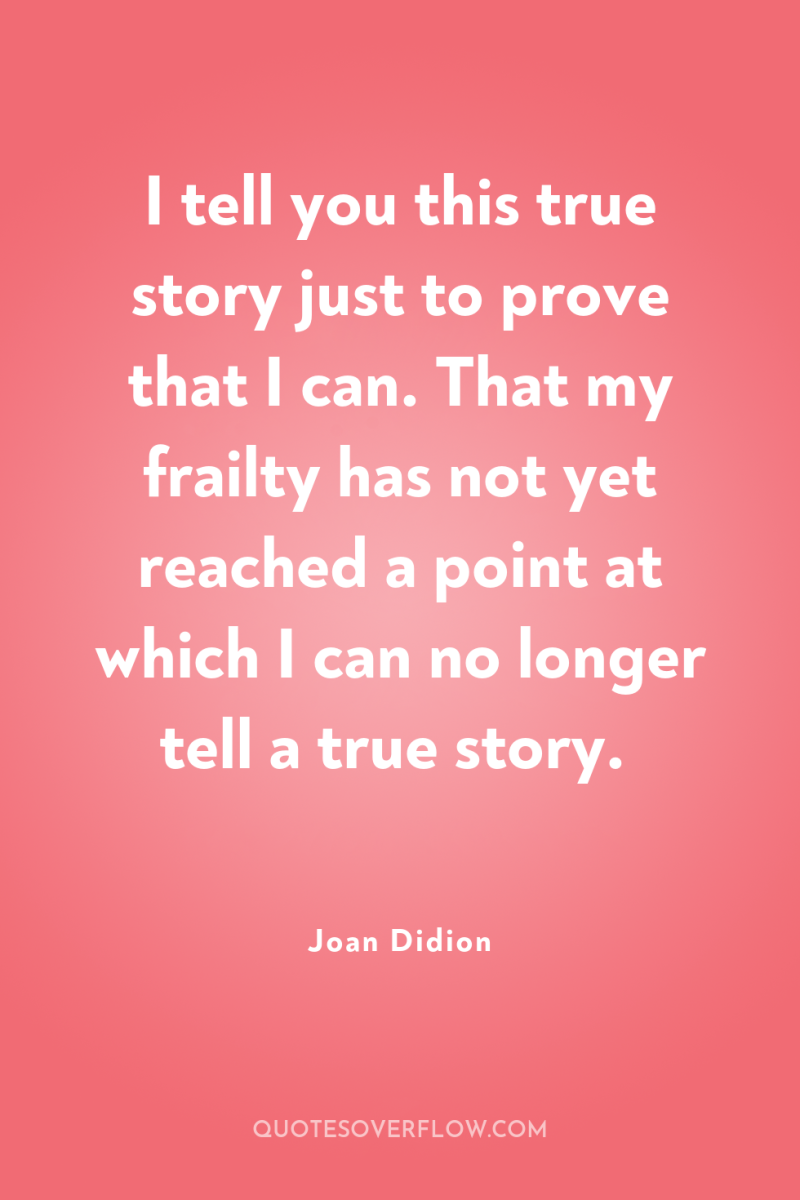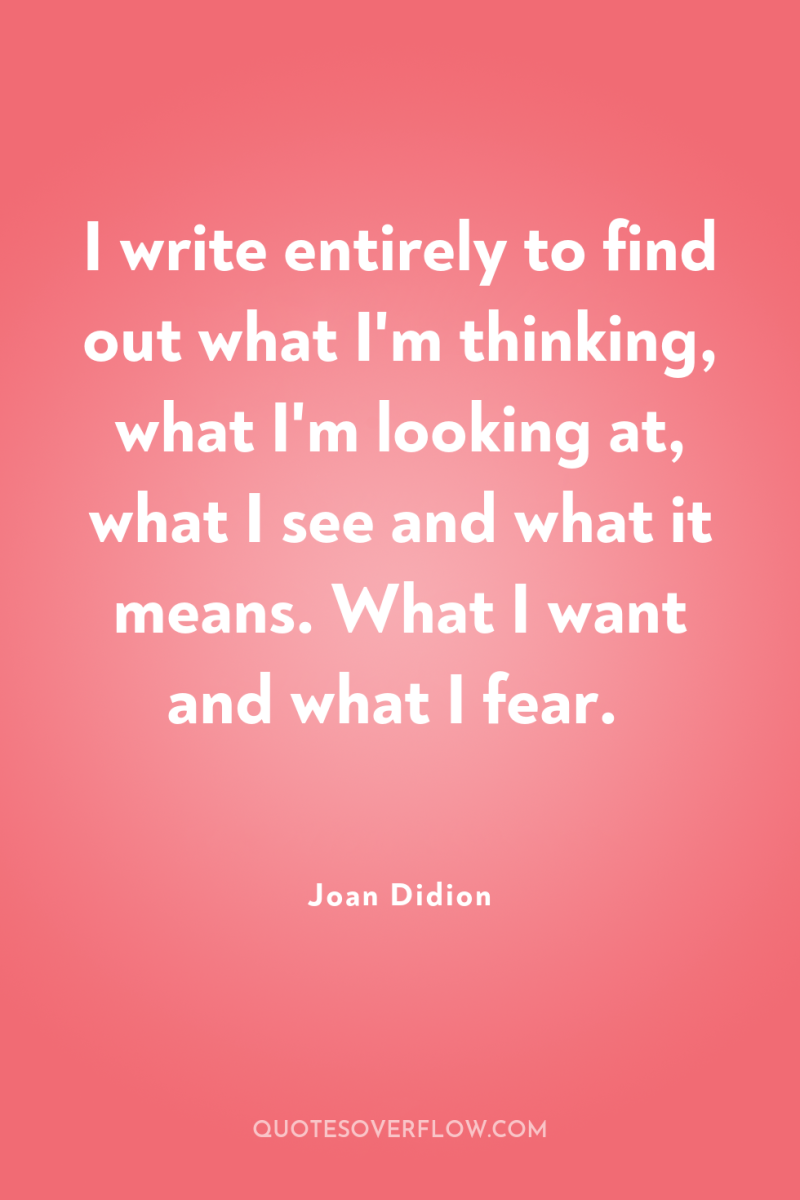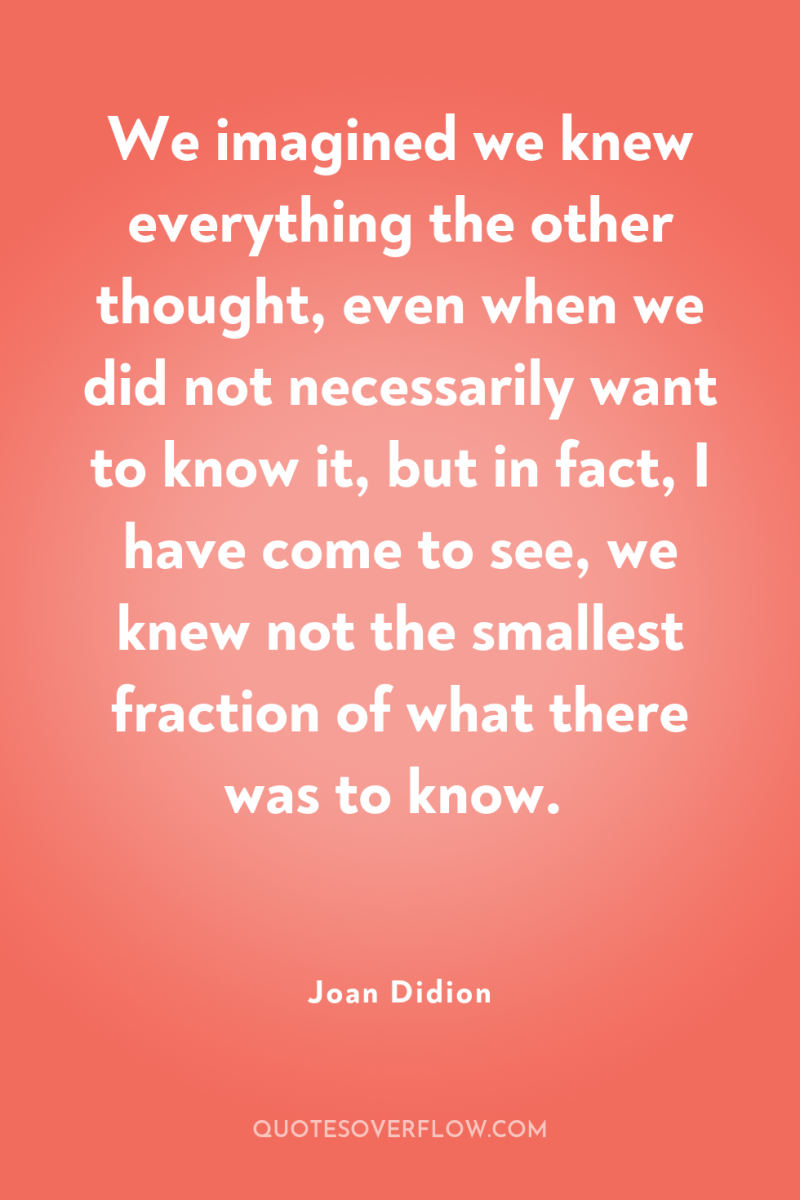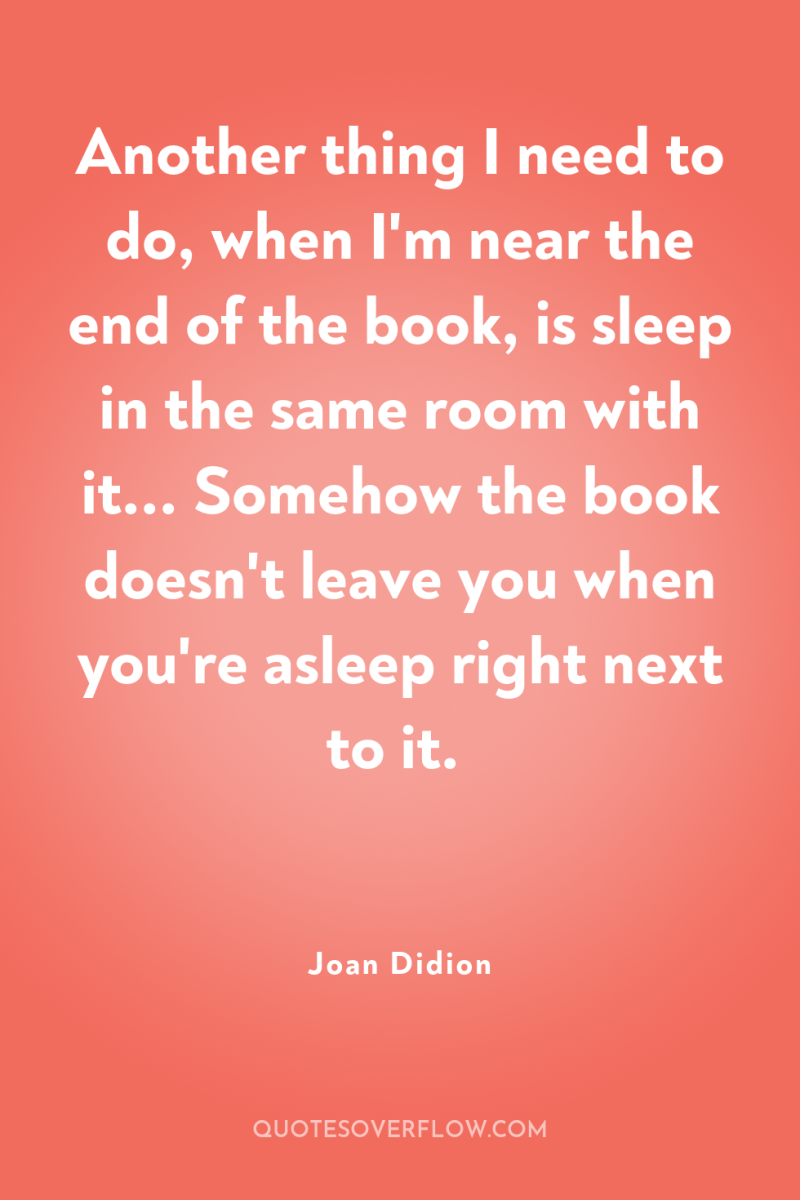1
Character – the willingness to accept responsibility for one's own life – is the source from which self-respect springs.Joan Didion

2
I tell you this true story just to prove that I can. That my frailty has not yet reached a point at which I can no longer tell a true story.Joan Didion

3
I write entirely to find out what I'm thinking, what I'm looking at, what I see and what it means. What I want and what I fear.Joan Didion
4
The impulse to write things down is a peculiarly compulsive one, inexplicable to those who do not share it, useful only accidentally, only secondarily, in the way that any compulsion tries to justify itself. I suppose that it begins or does not begin in the cradle.Joan Didion

5
Was it only by dreaming or writing that I could find out what I thought?Joan Didion

6
We imagined we knew everything the other thought, even when we did not necessarily want to know it, but in fact, I have come to see, we knew not the smallest fraction of what there was to know.Joan Didion

7
Do not whine... Do not complain. Work harder. Spend more time alone.Joan Didion

8
Another thing I need to do, when I'm near the end of the book, is sleep in the same room with it... Somehow the book doesn't leave you when you're asleep right next to it.Joan Didion
9
Webley Edwards was on the radio, they remember that, and what he said that morning again and again was “This is an air raid, take cover, this is the real McCoy.” That is not a remarkable thing to say, but it is a remarkable thing to have in one’s memory.Joan Didion
10
That we have made a hero of Howard Hughes tells us something interesting about ourselves, something only dimly remembered, tells us that the secret point of money and power in America is neither the things that money can buy nor power for power’s sake (Americans are uneasy with their possessions, guilty about power, all of which is difficult for Europeans to perceive because they are themselves so truly materialistic, so versed in the uses of power), but absolute personal freedom, mobility, privacy. It is the instinct which drove America to the Pacific, all through the nineteenth century, the desire to be able to find a restaurant open in case you want a sandwich, to be a free agent, live by one’s own rules.Joan Didion
11
What these men represented was not 'The West' but what was for this century a relatively new kind of monied class in America, a group devoid of social responsibilities because their ties to any one place had been so attenuated.Joan Didion
12
We tell ourselves stories in order to live.Joan Didion
13
The past could be jettisoned .. . but seeds got carried.Joan Didion
14
The apparently bottomless gulf between what we say we want and why we do want, between what we officially admire and secretly desire, between, in the largest sense, the people we marry and the people we love.Joan Didion
15
Of course the activists–not those whose thinking had become rigid, but those whose approach to revolution was imaginatively anarchic–had long ago grasped the reality which still eluded the press: we were seeing something important. We were seeing the desperate attempt of a handful of pathetically unequipped children to create a community in a social vacuum. Once we had seen these children, Ave could no longer overlook the vacuum, no longer pretend that the society’s atomization could be reversed. This was not a traditional generational rebellion. At some point between 1945 and 1967 we had somehow neglected to tell these children the rules of the game we happened to be playing. Maybe we had stopped believing in the rules ourselves, maybe we were having a failure of nerve about the game. Maybe there were just too few people around to do the telling. These were children who grew up cut loose from the web of cousins and great-aunts and family doctors and lifelong neighbors who had traditionally suggested and enforced the society’s values. They are children who have moved around a lot, San Jose, Chula Vista, here. They are less in rebellion against the society than ignorant of it, able only to feed back certain of its most publicized self-doubts, Vietnam, Saran-Wrap, diet pills, the Bomb.They feed back exactly what is given them. Because they do not believe in words–words are for “typeheads, ” Chester Anderson tells them, and a thought which needs words is just one more of those ego trips–their only proficient vocabulary is in the society’s platitudes. As it happens I am still committed to the idea that the ability to think for one’s self depends upon one’s mastery of the language, and I am not optimistic about children who will settle for saying, to indicate that their mother and father do not live together, that they come from “a broken home.” They are sixteen, fifteen, fourteen years old, younger all the time, an army of children waiting to be given the words.Joan Didion
16
[P]eople with self-respect have the courage of their mistakes. They know the price of things.Joan Didion
17
We still counted happiness and health and love and luck and beautiful children as "ordinary blessings.Joan Didion
18
When we talk about mortality we are talking about our children.Joan Didion
19
I was thinking as small children think, as if my thoughts or wishes had the power to reverse the narrative, change the outcome.Joan Didion
20
Someone who lives always with a plane schedule in the drawer lives on a slightly different calendar.Joan Didion
21
I know why we try to keep the dead alive: we try to keep them alive in order to keep them with us. I also know that if we are to live ourselves there comes a point at which we must relinquish the dead, let them go, keep them dead. Let them become the photograph on the table. Let them become the name on the trust accounts. Let go of them in the water. Knowing this does not make it any easier to let go of him in the water.Joan Didion
22
I bought new strings of colored lights. This served as a profession of faith in the future. I take the opportunity for such professions where and when I can invent them, since I do not yet actually feel this faith in the future.Joan Didion
23
Certain places seem to exist mainly because someone has written about them.Joan Didion
24
As it happens I am comfortable with the Michael Laskis of this world, with those who live outside rather than in, those in whom the sense of dread is so acute that they turn to extreme and doomed commitments; I know something about dread myself, and appreciate the elaborate systems with which some people manage to fill the void, appreciate all the opiates of the people, whether they are as accessible as alcohol and heroin and promiscuity or as hard to come by as faith in God or History. But of course I did not mention dread to Michael Laski, whose particular opiate is History. I did suggest “depression, ” did venture that it might have been “depressing” for him to see only a dozen or so faces at his last May Day demonstration, but he told me that depression was an impediment to the revolutionary process, a disease afflicting only those who do not have ideology to sustain them.Joan Didion
25
This was an adequate enough performance, as improvisations go. The only problem was that my entire education, everything I had ever been told or had told myself, insisted that the production was never meant to be improvised: I was supposed to have a script, and had mislaid it. I was supposed to hear cues, and no longer did. I was mean to know the plot, but all I knew was what I saw: flash pictures in variable sequence, images with no "meaning" beyond their temporary arrangement, not a movie but a cutting-room experience. In what would probably be the middle of my life I wanted still to believe in the narrative and in the narrative’s intelligibility, but to know that one could change the sense with every cut was to begin to perceive the experience as more electrical than ethical.Joan Didion
26
Alcohol has its own well-know defects as a medication for depression but no one has ever suggested - ask any doctor - that it is not the most effective anti-anxiety agent yet known.Joan Didion
27
Grief turns out to be a place none of us know until we reach it.. We might expect that we will be prostrate, inconsolable, crazy with loss. We do not expect to be literally crazy, cool customers who believe that their husband is about to return and need his shoes. In the version of grief we imagine, the model will be 'healing.' A Certain forward movement will prevail. The worst days will be the earliest days. We imagine that the moment to most severely test us will be the funeral, after which this hypothetical healing will take place. When we anticipate the funeral we wonder about failing to 'get through it, ' rise to the occasion, exhibit the 'strength' that invariably gets mentioned as the correct response to death. We anticipate needing to steel ourselves for the moment: will I be able to greet people, will I be able to leave the scene, will I be able even to get dressed that day? We have no way of knowing that this will not be the issue. We have no way of knowing that the funeral itself will be anodyne, a kind of narcotic regression in which we are wrapped in the care of others and the gravity and meaning of the occasion. Nor can we know ahead of the fact the unending absence that follows, the void, the very opposite of meaning, the relentless succession of moments during which we will confront the experience of meaninglessness itself. .Joan Didion
28
We are imperfect mortal beings, aware of that mortality even as we push it away, failed by our very complication, so wired that when we mourn our losses we also mourn, for better or for worse, ourselves. as we were. as we are no longer. as we will one day not be at all.Joan Didion
29
Why did I think that this improvisation could never end? If I had seen that it could, what would I have done differently? What would he?Joan Didion
30
Survivors look back and see omens, messages they missed. They remember the tree that died, the gull that splattered onto the hood of the car. They live by symbols. They read meaning into the barrage of spam on the unused computer, the delete key that stops working, the imagined abandonment in the decision to replace it.Joan Didion
31
We might, in that indeterminate period they call mourning, be in a submarine, silent on the ocean's bed, aware of the depth charges, now near and now far, buffeting us with recollections.. ..Grief is different. Grief has no distance. Grief comes in waves, paroxysms, sudden apprehensions that weaken the knees and blind the eyes and obliterate the dailiness of life.Joan Didion
32
Until now I had been able only to grieve, not mourn. Grief was passive. Grief happened. Mourning, the act of dealing with grief, required attention.Joan Didion
33
I realized that for the time being I could not trust myself to present a coherent face to the world.Joan Didion
34
My father was dead, my mother was dead, I would need for a while to watch for mines, but I would still get up in the morning and send out the laundry. I would still plan a menu for Easter lunch. I would still remember to renew my passport. Grief is different. Grief has no distance. Grief comes in waves, paroxysms, sudden apprehensions that weaken the knees and blind the eyes and obliterate the dailiness of life.Joan Didion
35
People who have recently lost someone have a certain look, recognizable maybe only to those who have seen that look on their own faces. I have noticed it on my face and I notice it now on others. The look is one of extreme vulnerability, nakedness, openness. It is the look of someone who walks from the ophthalmologist's office into the bright daylight with dilated eyes, or of someone who wears glasses and is suddenly made to take them off. These people who have lost someone look naked because they think themselves invisible. I myself felt invisible for a period of time, incorporeal. I seemed to have crossed one of those legendary rivers that divide the living from the dead, entered a place in which I could be seen only by those who were themselves recently bereaved. I understood for the first time the power in the image of the rivers, the Styx, the Lethe, the cloaked ferryman with his pole. I understood for the first time the meaning in the practice of suttee. Widows did not throw themselves on the burning raft out of grief. The burning raft was instead an accurate representation of the place to which their grief (not their families, not the community, not custom, their grief) had taken them.Joan Didion
36
It occurs to me that we allow ourselves to imagine only such messages as we need to survive.Joan Didion
37
...nor can we know ahead of the fact the unending absence that follows, the void, the very opposite of meaning, the relentless succession of moments during which we will confront the experience of meaningless itself.Joan Didion
38
Memories are what you no longer want to remember.Joan Didion
39
He meant doing things not because we were expected to do them or had always done them or should do them but because we wanted to do themJoan Didion
40
More than anyone else in the society, these men had apparently dreamed the dream and made it work. And what they did then was to build a place which seems to illustrate, as in a child’s primer, that the production ethic led step by step to unhappiness, to restrictiveness, to entrapment in the mechanics of living.Joan Didion
41
It is hard for me to believe that Cornelius Vanderbilt did not sense, at some point in time, in some dim billiard room of his unconscious, that when he built “The Breakers” he damned himself.Joan Didion
42
She knew all the indices to the idle lonely, never bought a small tube of toothpaste, never dropped a magazine in her shopping card.Joan Didion
43
We forget all too soon the things we thought we could never forget. We forget the loves and the betrayals alike, forget what we whispered and what we screamed, forget who we were.Joan Didion
44
I think we are well advised to keep on nodding terms with the people we used to be, whether we find them attractive company or not. Otherwise they turn up unannounced and surprise us, come hammering on the mind’s door at 4 a.m. of a bad night and demand to know who deserted them, who betrayed them, who is going to make amends. We forget all too soon the things we thought we could never forget. We forget the loves and the betrayals alike, forget what we whispered and what we screamed, forget who we were. I have already lost touch with a couple of people I used to be… .Joan Didion
45
It all comes back. Perhaps it is difficult to see the value in having one's self back in that kind of mood, but I do see it; I think we are well advised to keep on nodding terms with the people we used to be, whether we find them attractive company or not. Otherwise they turn up unannounced and surprise us, come hammering on the mind's door at 4 a.m. of a bad night and demand to know who deserted them, who betrayed them, who is going to make amends. We forget all too soon the things we thought we could never forget. We forget the loves and the betrayals alike, forget what we whispered and what we screamed, forget who we were. I have already lost touch with a couple of people I used to be; one of them, a seventeen-year-old, presents little threat, although it would be of some interest to me to know again what it feels like to sit on a river levee drinking vodka-and-orange-juice and listening to Les Paul and Mary Ford and their echoes sing "How High the Moon" on the car radio. (You see I still have the scenes, but I no longer perceive myself among those present, no longer could ever improvise the dialogue.) The other one, a twenty-three-year-old, bothers me more. She was always a good deal of trouble, and I suspect she will reappear when I least want to see her, skirts too long, shy to the point of aggravation, always the injured party, full of recriminations and little hurts and stories I do not want to hear again, at once saddening me and angering me with her vulnerability and ignorance, an apparition all the more insistent for being so long banished. It is a good idea, then, to keep in touch, and I suppose that keeping in touch is what notebooks are all about. And we are all on our own when it comes to keeping those lines open to ourselves: your notebook will never help me, nor mine you.Joan Didion
46
There is no real way to deal with everything we lose.Joan Didion
47
I wake and feel the fell of dark, not day. And I have asked to be where no storms come.Joan Didion
48
My only advantage as a reporter is that I am so physically small, so temperamentally unobtrusive, and so neurotically inarticulate that people tend to forget that my presence runs counter to their interests. And it always does. That is one last thing to remember: writers are always selling somebody out.Joan Didion
49
Let me tell you one thing about why writers write: had I known the answer to any of these questions I would never have needed to write a novelJoan Didion
50
The ability to think for one's self depends upon one's mastery of the language.Joan Didion
51
I had only some dim and unformed sense, a sense which struck me now and then, and which I could not explain coherently, that for some years the South and particularly the Gulf Coast had been for America what people were still saying California was, and what California seemed to me not to be: the future, the secret source of malevolent and benevolent energy, the psychic center.Joan Didion
52
It occurred to me almost constantly in the South that had I lived there I would have been an eccentric and full of anger, and I wondered what form the anger would have taken. Would I have taken up causes, or would I have simply knifed somebody?Joan Didion
53
When we start deceiving ourselves into thinking not that we want something or need something, not that it is a pragmatic necessity for us to have it, but that it is a moral imperative that we have it, then is when we join the fashionable madmen, and then is when the thin whine of hysteria is heard in the land, and then is when we are in bad trouble. And I suspect we are already there.Joan Didion
54
The death of a parent, he wrote, 'despite our preparation, indeed, despite our age, dislodges things deep in us, sets off reactions that surprise us and that may cut free memories and feelings that we had thought gone to ground long ago...Joan Didion
55
In theory momentos serve to bring back the moment. In fact they serve only to make clear how inadequately I appreciated the moment when it was here. How inadequately I appreciated the moment when it was here is something else I could never afford to see.Joan Didion
56
I do not know many people who think they have succeeded as parents. Those who do tend to cite the markers that indicate (their own) status in the world: the Stanford degree.... Those of us less inclined to compliment ourselves on our parenting skills, in other words most of us, recite rosaries of our failures, our neglects, our derelictions and delinquencies.Joan Didion
57
I will not forget the instinctive wisdom of the friend who, every day for those first few weeks, brought me a quart container of scallion-and-ginger congee from Chinatown. Congee I could eat. Congee was all I could eat.Joan Didion
58
Was there ever in anyone's life span a point free in time, devoid of memory, a point when choice was any more than sum of all the choices gone before?Joan Didion
59
I put the word "diagnosis" in quotes because I have not yet seen that case in which a "diagnosis" led to a "cure, " or in fact to any outcome other than a confirmed, and therefore an enforced, debility.Joan Didion
60
We tell ourselves stories in order to live. We live entirely by the impression of a narrative line upon disparate images, the shifting phantasmagoria, which is our actual experience.Joan Didion
61
It did not occur to me to call a doctor, because I knew none, and although it did occur to me to call the desk and ask that the air conditioner be turned off, I never called, because I did not know how much to tip whoever might come–was anyone ever so young?Joan Didion
62
I am a writer. Imagining what someone would say or do comes to me as naturally as breathing.Joan Didion
63
...the child trying not to appear as a child, of the strenuousness with which she tried to present the face of a convincing adult.Joan Didion
64
Their suburbia house in Brentwood" was how she referred to the house when we bought it, a twelve-year-old establishing that it was not her decision, not her taste, a child claiming the distance all children imagine themselves to need.Joan Didion
65
Only the survivors of a death are truly left alone.Joan Didion
66
As a writer, even as a child, long before what I wrote began to be published, I developed a sense that meaning itself was resident in the rhythms of words and sentences and paragraphs... The way I write is who I am, or have become...Joan Didion
67
The impulse to write things down is a peculiarly compulsive one, inexplicable to those who do not share it, useful only accidentally, only secondarily, in the way that any compulsion tries to justify itself. I suppose that it begins or does not begin in the cradle. Although I have felt compelled to write things down since I was five years old, I doubt that my daughter ever will, for she is a singularly blessed and accepting child, delighted with life exactly as life presents itself to her, unafraid to go to sleep and unafraid to wake up. Keepers of private notebooks are a different breed altogether, lonely and resistant rearrangers of things, anxious malcontents, children afflicted apparently at birth with some presentiment of loss. .Joan Didion
68
A doctor to whom I occasionally talk suggest that I have made an inadequate adjustment to aging. Wrong, I want to say. In fact I have made no adjustment whatsoever to aging. In fact I had lived my entire life to date without seriously believing that I would age.Joan Didion
69
I invent a reason for the Hertz attendant to start the rental car. I am seventy-five years old: this is not the reason I give.Joan Didion
70
Aging and its evidence remain life's most predictable events, yet they also remain matters we prefer to leave unmentioned, unexplored.Joan Didion
71
Making judgments on films is in many ways so peculiarly vaporous an occupation that the only question is why, beyond the obvious opportunities for a few lectures fees and a little careerism at a dispiritingly self-limiting level, anyone does it in the first place.Joan Didion
72
I write entirely to find out what I'm thinking, what I'm looking at, what I see and what it means. What I want and what I fear>Joan Didion
73
I wanted to get the tears out of the way so I could act sensibly.Joan Didion
74
And except on a certain kind of winter evening–six-thirty in the Seventies, say, already dark and bitter with a wind off the river, when I would be walking very fast toward a bus and would look in the bright windows of brownstones and see cooks working in clean kitchens and and imagine women lighting candles on the floor above and beautiful children being bathed on the floor above that–except on nights like those, I never felt poor; I had the feeling that if I needed money I could always get it.Joan Didion
75
I could not count the times during the average day when something would come up that I needed to tell him. This impulse did not end with his death. What ended was the possibility of response.Joan Didion
76
Medicine, I have reason since to notice more than once, remains an imperfect art.Joan Didion
77
Carter and Helene still ask questions. I used to ask questions, and I got the answer: nothing. The answer is “nothing.Joan Didion
78
I remember walking across Sixty-second Street one twilight that first spring, or the second spring, they were all alike for a while. I was late to meet someone but I stopped at Lexington Avenue and bought a peach and stood on the corner eating it and knew that I had come out out of the West and reached the mirage. I could taste the peach and feel the soft air blowing from a subway grating on my legs and I could smell lilac and garbage and expensive perfume and I knew that it would cost something sooner or later–because I did not belong there, did not come from there–but when you are twenty-two or twenty-three, you figure that later you will have a high emotional balance, and be able to pay whatever it costs. I still believed in possibilities then, still had the sense, so peculiar to New York, that something extraordinary would happen any minute, any day, any month. .Joan Didion
79
I would stay in New York, I told him, just six months, and I could see the Brooklyn Bridge from my window. As it turned out the bridge was the Triborough, and I stayed eight years.Joan Didion
80
Innocence ends when one is stripped of the delusion that one likes oneself.Joan Didion
81
It was the United States of America in the cold late spring of 1967, and the market was steady and the G.N.P. high and a great many articulate people seemed to have a sense of high social purpose and it might have been a spring of brave hopes and national promise, but it was not, and more and more people had the uneasy apprehension that it was not.Joan Didion
82
I know what the fear is. The fear is not for what is lost. What is lost is already in the wall. What is lost is already behind the locked doors. The fear is for what is still to be lost.Joan Didion
83
My only advantage as a reporter is that I am so physically small, so temperamentally unobtrusive, and so neurotically inarticulate that people tend to forget that my presence runs counter to their best interests. And it always does.Joan Didion
84
Privilege" is something else." Privilege" is a judgment." Privilege" is an opinion." Privilege" is an accusation.Joan Didion
85
To cure jealousy is to see it for what it is a dissatisfaction with self.Joan Didion
86
The willingness to accept responsibility for one's own life is the source from which self-respect springs.Joan Didion
87
Most of our platitudes notwithstanding self-deception remains the most difficult deception. The tricks that worked on others count for nothing in that very well-lit back alley where one keeps assignations with oneself: no winning smiles will do here no prettily drawn list of good intentions.Joan Didion
88
To have that sense of one's intrinsic worth which constitutes self-respect is potentially to have everything.Joan Didion
89
When we start deceiving ourselves into thinking not that we want something or need something not that it is a pragmatic necessity for us to have it but that it is a moral imperative that we have it. Then is when we join the fashionable madmen and then is when the thin whine of hysteria is heard in the land and then is when we are in bad trouble.Joan Didion
90
I write entirely to find out what I'm thinking what I'm looking at what I see and what it means what I want and what I fear.Joan Didion
91
We are well advised to keep on nodding terms with the people we used to be whether we find them attractive company or not.... We forget all too soon the things we thought we could never forget.Joan Didion
92
There is one last thing to remember: writers are always selling somebody out.Joan Didion
93
Most of our platitudes notwithstanding, self-deception remains the most difficult deception. The tricks that work on others count for nothing in that very well-lit back alley where one keeps assignation with oneself: no winning smiles will do here, no prettily drawn lists of good intentions. One shuffles flashily but in vain through one's marked cards- the kindness done for the wrong reason, the apparent triumph which involved no real effort, the seemingly heroic act into which one had been shamed.Joan Didion
94
To have that sense of one’s intrinsic worth which constitutes self-respect is potentially to have everything: the ability to discriminate, to love and to remain indifferent. To lack it is to be locked within oneself, paradoxically incapable of either love or indifference. If we do not respect ourselves, we are the one hand forced to despise those who have so few resources as to consort with us, so little perception as to remain blind to our fatal weaknesses. On the other, we are peculiarly in thrall to everyone we see, curiously determined to live out — since our self-image is untenable — their false notion of us. We flatter ourselves by thinking this compulsion to please others an attractive trait: a gist for imaginative empathy, evidence of our willingness to give. Of course I will play Francesca to your Paolo, Helen Keller to anyone’s Annie Sullivan; no expectation is too misplaced, no role too ludicrous. At the mercy of those we cannot but hold in contempt, we play roles doomed to failure before they are begun, each defeat generating fresh despair at the urgency of divining and meeting the next demand made upon us. .Joan Didion
95
There is a common superstition that “self-respect” is a kind of charm against snakes, something that keeps those who have it locked in some unblighted Eden, out of strange beds, ambivalent conversations, and trouble in general. It does not at all. It has nothing to do with the face of things, but concerns instead a separate peace, a private reconciliation.Joan Didion
96
The dismal fact is that self-respect has nothing to do with the approval of others – who are, after all, deceived easily enough; has nothing to do with reputation, which, as Rhett Butler told Scarlett O’Hara, is something people with courage can do without. To do without self-respect, on the other hand, is to be an unwilling audience of one to an interminable documentary that deals with one’s failings, both real and imagined, with fresh footage spliced in for every screening. There’s the glass you broke in anger, there’s the hurt on X’s face; watch now, this next scene, the night Y came back from Houston, see how you muff this one. To live without self-respect is to lie awake some night, beyond the reach of warm milk, the Phenobarbital, and the sleeping hand on the coverlet, counting up the sins of commissions and omission, the trusts betrayed, the promises subtly broken, the gifts irrevocably wasted through sloth or cowardice, or carelessness. However long we postpone it, we eventually lie down alone in that notoriously uncomfortable bed, the one we make ourselves. Whether or not we sleep in it depends, of course, on whether or not we respect ourselves.Joan Didion
97
To free us from the expectations of others, to give us back to ourselves - there lies the great, singular power of self-respect.Joan Didion
98
It kills me when people talk about California hedonism. Anybody who talks about California hedonism has never spent a Christmas in Sacramento.Joan Didion
99
I'm not sure I have the physical strength to undertake a novel.Joan Didion
100
Strength is one of those things you're supposed to have. You don't feel that you have it at the time you're going through it.Joan Didion